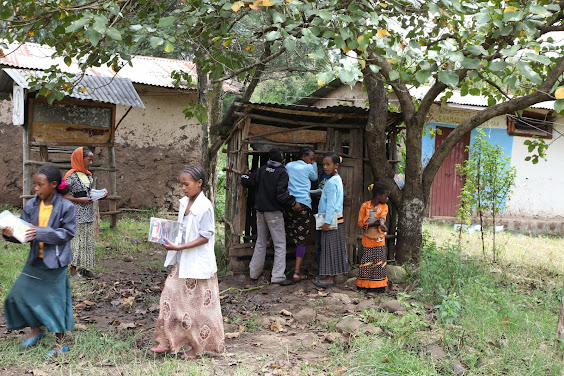Around 60% of the global population - 4.5 billion people still do not have access to a toilet that safely manages human waste at home. In Africa, an unmatched population boom has led to the migration of million of people to fast-growing cities, creating further pressure on decades-old public facilities. Dangerous practices such as open defecation are often resorted to, and it is women that are disproportionately hampered by the persistent lack of access to sanitation in many African nations. The patriarchy and gender norms mean that women's sanitary needs are often neglected during decision-making and even when the infrastructure is present, high costs and dangers of sexual violence make going to the toilet safely, a routine that should be a human right, impossible.
Case study: Mathare Valley, Nairobi, Kenya
In 2011, there were around 145 public toilet facilities in Mathare, an informal settlement in Nairobi, with 17 to 232 people relying on a single toilet. These are commonplace in cities like Nairobi and several efforts by NGOs as well as the government have been made to increase the number of toilets available, yet many still require a payment of between KES 3 and 10 to use. This immediately restricts use for those who cannot afford it and women are often prevented from spending money on sanitation by their husbands. Those who do use them have raised concerns about poor lighting, lack of water to flush or wash hands and broken locks, impacting physical safety. The toilets are physically available, but evidently this has not solved the overarching problems, with women still not using them.
Impossible decisions
As a result, over 30% of women in Mathare resorted to the use of buckets, plastic bags and open defecation at least once during the day and the use of these methods doubled during at night. Not only does this exacerbate the spread of diseases like hepatitis A and polio, but women are more vulnerable to sexual violence. In South Africa, the highest rate of past year non-partner sexual violence was observed in women who only had access to shared toilet facilities (7.2%) and those without any toilets (7.1%), compared to 5.5% and 4.8% in those with personal outdoor and indoor toilets respectively. Many women use public toilets in larger groups to reduce the possibility of sexual violence, which also reduces privacy. It is appalling that so many are unable to use a toilet safely.


This blog post was a really interesting read, and I wholeheartedly agree that a mutli-sectoral approach is required, to come up with a solution that addresses these otherwise dangerous and inefficient toilets in Mathare. You mentioned a key criticism of the cost of these public toilet facilities- would you say that women who have children are put at an even greater disadvantage, since it will be more expensive, and therefore they may have less access to sanitation facilities?
ReplyDeleteHi Maya, thanks for your comment! I certainly would agree that women with children will face even greater challenges and furthermore, children may be forced to miss education and subsequently work in lower-income households. I think overall, the main issue is not the lack of physical infrastructure but poor management.
DeleteI thoroughly enjoyed reading this post! I found the numbers of people sharing a toilet really shocking, it is clear that improvements need to be made in relation to access to toilets and sanitation. Given that one of the greatest threats facing women when they use the toilet is violence would you also suggests that anti-violence education would be valuable to mitigating this threat? and are there any instances that you know of where this has been implemented?
ReplyDeleteThanks for your comment Helen! There have been initiatives where anti-violence education has been implemented, in cities like Cape Town in South Africa. This, combined with improving infrastructure such as a greater number of toilets with locks and better street lighting can help reduce violence. I do think that this is an issue that requires a variety of initiatives to solve.
Delete